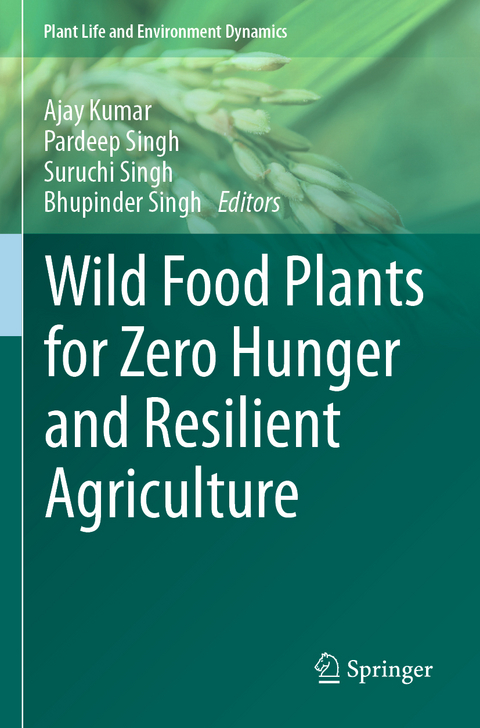
Wild Food Plants for Zero Hunger and Resilient Agriculture
Springer Verlag, Singapore
978-981-19-6504-3 (ISBN)
Dr. Ajay Kumar is working as Assistant Professor of Plant Science at Central University of Kerala, India. He has obtained is PhD from School of Life Sciences, Jawaharlal Nehru University, New Delhi under the guidance of Dr. Nirala Ramchiary who is a renowned crop scientist. Dr. Ajay has more than six years of teaching and research experience and has published several papers, review articles and book chapters in reputed journals and books respectively. His areas of research include phytochemical genomics, wild food plants, traditional food systems, food security and abiotic stresses. He has been a member of Academic Council, Central University of Kerala in the past and currently he is the member of University Court. He has successfully guided more than 30 Post Graduate students for their dissertations. Dr. Pardeep Singh is presently working as an Assistant professor (Department of Environmental Studies, PGDAV College University of Delhi, New Delhi,India). He has obtained his master’s degree from the Department of Environmental Science at Banaras Hindu University, Varanasi India and his doctorate degree from the Indian Institute of Technology (Banaras Hindu University) Varanasi. He has published more than 75 research articles in international journals in the field of Environmental management and edited more than 45 books. Dr. Suruchi Singh is presently working as Faculty in the Department of Botany, Sunbeam College for Women, India. She obtained her PhD from Banaras Hindu University, India in Botany with Environmental Science as major field. Dr Singh received her postdoctoral experiences in Department of Botany, Banaras Hindu University under Council of Scientific and Industrial Research and Department of Science and Technology. She has published articles in various international journals and books series (>50 peer reviewed articles). In her research, she has identified processes and activities where environmental efficiencies of selected crop plants must be increased against UV-B and tropospheric Ozone. Dr Bhupinder Singh Joined the Indian Council of Agricultural Research (ICAR) as a Scientist (Plant Physiology) in 1991 and was posted at the Nuclear Research Laboratory, Indian Agricultural Research Institute (IARI), New Delhi in 1992. Presently, he is working as a Principal Scientist and Head at the Centre for Environment Science and Climate Resilient Agriculture (CESCRA), ICAR-IARI. He is also discharging the additional responsibility of the Radiological Safety Officer (RSO), at the ICAR-IARI, New Delhi since 2006. He has more than 25 years of research and teaching experience and has focused his research pursuits in the Key area of nutriophysiology and radiophysiology. His scientific interests have helped in gaining insight into the role of phytosiderophore biosynthesis in improving Fe-Zn efficiency under limited nutrient availability and in phytoremediation of heavy metals. He has more than 90 research publications in reputed international and national journals. He has guided more than 13 PhD and MSc students and has several awards and recognitions to his credit such as ICAR-Lal Bahadur Shastri young scientist award, DST BOYSCAST fellowship, INSA-DAAD International scientific exchange fellowship, RD Asana gold medal, R.H. Dastur (AAAS) awards. His research pursuits have been supported by several of the funding agencies such as DST, ICAR, BARC, Tata Steel Ltd, Ministry of Steel, DBT etc. He is also a fellow of the Indian Society for Plant Physiology (ISPP) and was its elected Vice President for the years 2014-2015. He was a member of the Scientific panel on biological hazard (2009-2015); member, Scientific panel on the genetically modified organisms and foods (2015-2018) and Member of both Panels at FSSAI, Govt. of India (2019-2022).
Chapter 1. Wild food plants for zero hunger and resilient agriculture: An introduction.- Chapter 2. The culture has not faded: reliance on diverse wild edible plants in prehistory, history, and modern times.- Chapter 3. Wild Food Plants: History, Use and Impacts of Globalisation.- Chapter 4. Global traditional food systems that are based on wild food plants.- Chapter 5. Usage of wild edible plants among upland indigenous communities of Northeast India.- Chapter 6. Nutritional and health benefits of high altitude wild food plant, Hippophae rhamnoides for the Himalayan Communities.- Chapter 7. Nutritional potential of wild edible rose hips in India for food security.- Chapter 8. Ethnic mountain foods of Western and Eastern Himalaya, India.- Chapter 9. Reemergence of pseudocereals as super foods for food security and human health: Current progress and future prospects.- Chapter 10. Nutraceutical potential of tropical wild edible plants of India.- Chapter 11. Utilization of wild foodplants for crop improvement programs.- Chapter 12. Conservation of wild food plants and crop wild relatives: planning, strategies, priorities and legal frameworks.- Chapter 13. Databases relevant to wild food plants.- Chapter 14. A comprehensive update on traditional agricultural knowledge of farmers in India.
| Erscheinungsdatum | 06.04.2024 |
|---|---|
| Reihe/Serie | Plant Life and Environment Dynamics |
| Zusatzinfo | 1 Illustrations, black and white; XVI, 386 p. 1 illus. |
| Verlagsort | Singapore |
| Sprache | englisch |
| Maße | 155 x 235 mm |
| Themenwelt | Naturwissenschaften ► Biologie ► Ökologie / Naturschutz |
| Weitere Fachgebiete ► Land- / Forstwirtschaft / Fischerei | |
| Schlagworte | abiotic stress • biotic stress • forestry • Plant growth regulator • Steroids |
| ISBN-10 | 981-19-6504-8 / 9811965048 |
| ISBN-13 | 978-981-19-6504-3 / 9789811965043 |
| Zustand | Neuware |
| Informationen gemäß Produktsicherheitsverordnung (GPSR) | |
| Haben Sie eine Frage zum Produkt? |
aus dem Bereich


